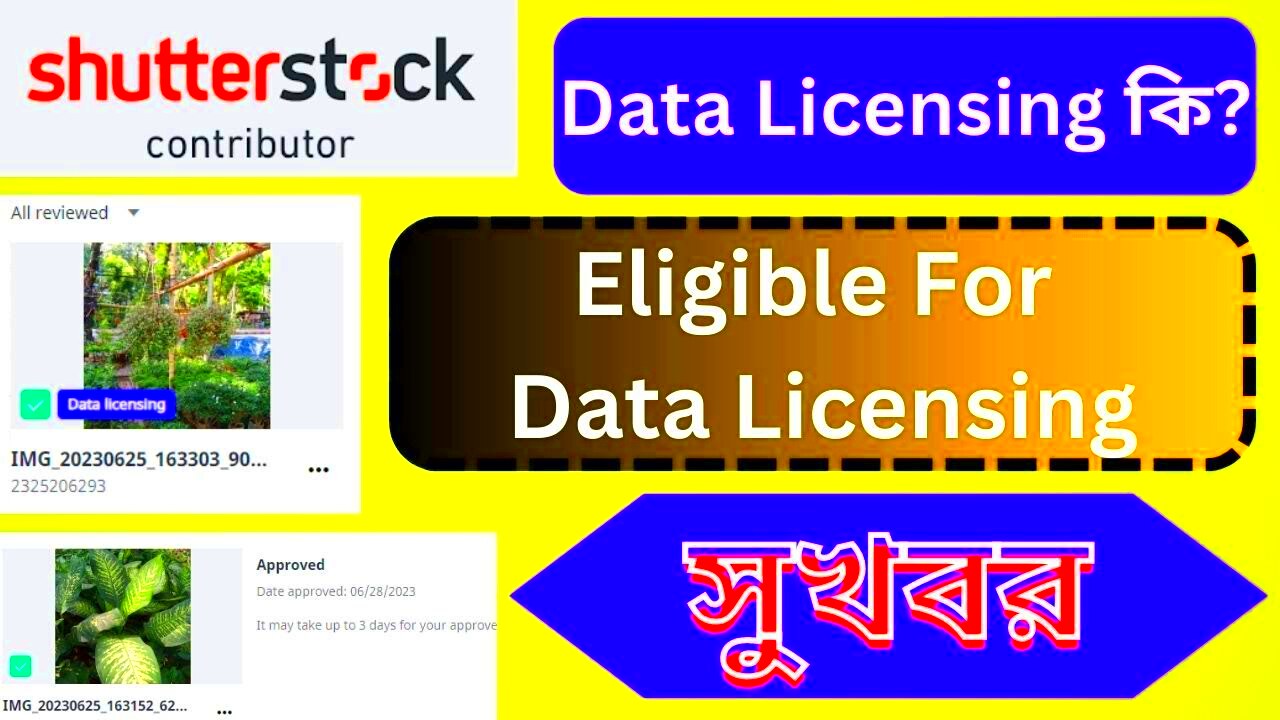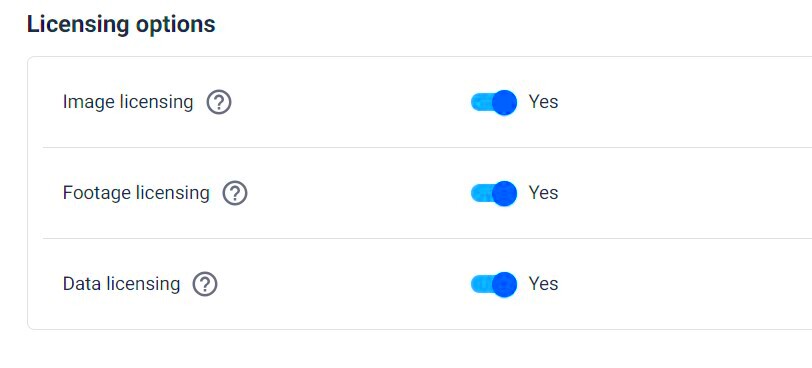Understanding Shutterstock Contributor Rights

As a contributor to
Shutterstock your rights pertain to the sharing and selling of your images. Heres a summary.
- Ownership: You retain ownership of your images, even after they are uploaded to Shutterstock.
- Usage Rights: Shutterstock users purchase licenses to use your images in various ways. This can include editorial, commercial, or personal use.
- Royalties: Every time your image is downloaded, you earn a royalty. The amount varies based on the license type and the agreement you have with Shutterstock.
When I started out I found the jargon quite overwhelming. However grasping these fundamental rights was essential. Its reassuring to know that you have a say in how your work is utilized even though the specifics can be somewhat complicated.
How Data Licensing Affects Your Work
The impact of data licensing on your professional activities is significant in several aspects. Let me elaborate on how it influences your work.
- Exposure: Licensing helps determine how widely and in what contexts your images can be used. A well-defined license can boost your visibility.
- Revenue: The type of license impacts your earnings. For example, extended licenses often lead to higher payouts but come with different usage rules.
- Control: Licensing agreements set boundaries on how your work is used, helping to prevent misuse or overexposure.
Looking back on my path I’ve realized that the choices I make in licensing can impact my income in various ways. Each type of license comes with its own set of guidelines and advantages. It’s a delicate balance where grasping these nuances can greatly influence your overall success as a contributor.
The Role of Contributor Agreements
When you become a contributor to
Shutterstock you enter into an agreement that lays out the terms of your partnership. Its like a handshake that sets clear expectations for both sides. I vividly recall the moment I signed my contributor agreement. It was like opening the door to a realm of opportunities but it also came with its fair share of challenges. Grasping this agreement is vital as it determines how your images will be managed and the type of compensation you can expect.
Here are the key points you should be aware of regarding these agreements.- Rights and Permissions: The agreement specifies what rights you are granting Shutterstock and how they can use your images.
- Compensation: It outlines the royalty structure and payment terms. Make sure to review these carefully to understand how and when you'll be paid.
- Exclusivity: Some agreements might require exclusivity, meaning you can’t sell the same images on other platforms. Weigh this carefully against the potential benefits.
- Termination Clauses: This part explains the conditions under which either party can end the agreement. It’s important to know this in case you need to make changes down the road.
Back when I was starting out I really benefited from talking to a friend who knew a thing or two about these kinds of deals. Having someone break down the tricky details in simple language was a game changer for me making sure I understood exactly what I was getting into before putting my name on the dotted line.
Different Types of Licenses Available
Shutterstock provides licenses catering to diverse requirements. Grasping these choices can assist you in selecting the most suitable one for your projects and optimizing your income. Initially when I came across these licenses I found it akin to maneuvering through a labyrinth. However simplifying their explanation significantly streamlined the journey.
Here’s a quick guide:- Standard License: This is the most common type, allowing buyers to use images for a range of uses like websites, social media, and brochures. It’s great for general exposure and frequent downloads.
- Extended License: This allows for more extensive use, such as in physical merchandise or high-quantity prints. It often comes with a higher payout for contributors.
- Editorial License: Ideal for images used in news articles or blogs, this license restricts commercial use and ensures your images are used in a context that reports on actual events.
- Royalty-Free vs. Rights-Managed: Royalty-free licenses allow buyers to use the image without additional fees, while rights-managed licenses come with specific usage restrictions and pricing based on the image’s usage.
Understanding the right license for your content allows you to make choices. I came to this realization through experience discovering that not all licenses are the same. Each license type comes with its own benefits and limitations so it's important to choose carefully depending on how you intend to use your work.
How to Manage Your Licensing Information
Staying on top of your licensing details is similar to maintaining a tidy toolbox. It helps you stay informed about the usage and performance of your images. In the beginning I found it challenging to keep everything organized but with a strategy it turned into a task that was not only doable but also quite enjoyable.
Here are some tips for effective management:- Keep Records: Maintain a detailed record of all your licenses, including types, terms, and expiration dates. This helps in tracking your income and understanding how your images are utilized.
- Use Digital Tools: Platforms like Shutterstock offer dashboards where you can view your licensing details and earnings. Regularly check these tools to stay updated.
- Review and Update: Periodically review your licensing agreements and update your records to reflect any changes or new agreements.
- Seek Support: If you have questions or concerns about your licensing information, don’t hesitate to reach out to Shutterstock’s support team. They can provide clarification and help resolve any issues.
Based on my own experiences I discovered that staying on top of my licenses through reminders and spreadsheets really helped me out. It may seem like a task but it’s worth it as it keeps you updated and in charge of your creative projects.
Common Questions About Data Licensing
Navigating the world of data licensing can be quite tricky with its complex legal language and terminology that often leaves contributors scratching their heads. Throughout the years I've encountered my share of questions and I've discovered that addressing these common concerns can really help clear up confusion. So let's dive into some frequently asked questions to make things a bit easier for you.
1. What does "royalty-free" mean?
Royalty-free means that once a buyer pays for the license, they don’t have to pay any additional fees for further use. However, this doesn’t mean the image is free of charge. It just simplifies the cost structure for buyers.
2. Can I sell the same image on other platforms?
Yes, if your agreement with
Shutterstock doesn’t require exclusivity, you can. Just ensure you're not violating any terms by overlapping licenses or misusing the image in any way.
3. What happens if someone misuses my image?
If you suspect misuse, it’s important to document the infringement and contact
Shutterstock’s support. They have processes in place to address these issues and protect your rights.
4. How do I know if my image is performing well?
Regularly check your Shutterstock dashboard. It provides insights into how often your images are downloaded and which licenses are most popular.From what I’ve seen getting a grip on these frequently asked questions has made me feel more at ease and self assured in handling my job. Staying up to date and reaching out for assistance when necessary is always wise.
Tips for Navigating Licensing Policies
Navigating licensing policies can be a bit challenging but with the strategy you can maneuver through them seamlessly. Based on my experiences here are some valuable insights that have significantly improved my approach to licensing.
- Read the Fine Print: Always thoroughly read the terms of each license. It might seem tedious, but it’s crucial for understanding what’s allowed and what’s not.
- Stay Updated: Licensing terms can change. Keep an eye on any updates from Shutterstock and adjust your practices accordingly to stay compliant.
- Use Clear Metadata: Make sure your images have accurate metadata, including licensing information. This helps in preventing misunderstandings and ensures proper attribution.
- Seek Clarification: If something isn’t clear, don’t hesitate to ask for help. Whether it’s contacting Shutterstock support or consulting a legal expert, clarity is key.
What I discovered is that being proactive and staying well informed can really impact things. It’s similar to having a trusty map while exploring a city it guides you in avoiding getting lost and helps you uncover the most efficient paths, to achievement.
Conclusion
In Shutterstock licensing goes beyond mere regulations; it serves as a means to uphold the fair usage and appreciation of your creative endeavors. By familiarizing yourself with your rights the various license options at your disposal and effective management of your licensing details you can safeguard your creations and optimize your income potential.Through my own experiences I can confidently say that honing these elements has had an impact on my work approach. Its not merely about marketing pictures but rather establishing a fulfilling and lasting profession. Invest the effort to grasp and handle your licensing effectively and it will yield rewards in terms of your career advancement and personal fulfillment.
 As a contributor to Shutterstock your rights pertain to the sharing and selling of your images. Heres a summary.
As a contributor to Shutterstock your rights pertain to the sharing and selling of your images. Heres a summary.
 admin
admin








